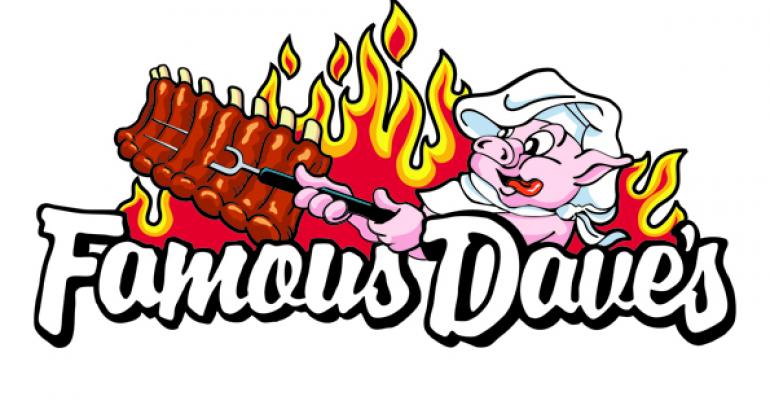Famous Dave’s of America said Wednesday that it has fallen out of compliance with requirements in its lending agreement with Wells Fargo amid falling sales and changes in both management and company strategy.
The company revealed the credit issue during a third-quarter earnings report in which the Minneapolis-based chain said that sales, profits and restaurant cash-flow margins all fell.
The company’s stock, already off by 60 percent from its high in February, fell by more than 15 percent Wednesday on the news.
Executives asked for patience to reverse these trends during an earnings call Wednesday. They also blamed many of the problems on previous management, saying that the issues stemmed from changes made under Ed Rensi, who stepped down as CEO in June.
“Late in the second quarter and early in the third quarter, there was a significant change in senior management and the board, as the board was not satisfied with the direction of the company and its results,” Adam Wright, interim CEO of the 180-unit chain, said during the call.
Wright said the chain and its board have “dedicated significant attention to improving the Famous Dave’s system.”
“While we are now confident in the direction of the company, the changes will take time to take effect as we undo the mistakes of prior management and attempt to win back customers we disappointed while at the same time acquiring new customers," he said. "Although the quarterly results are disappointing, the company has taken significant action and is making progress that benefits the business in the long term.”
The more immediate issue is the credit agreement with Wells Fargo. Executives said that the company’s adjusted leverage and cash flow ratios fell below what is required as part of the company’s credit agreement at the end of the third quarter.
The company said that it is in discussions with Wells Fargo on the issue, and it anticipates a deal to waive the requirements or amend the credit deal.
Net income at Famous Dave’s fell 65 percent, to $708,000, or 10 cents per share, from $2 million, or 28 cents per share.
Revenue fell 15.6 percent, to $31.8 million, from $37.7 million. The company said that the closure of four restaurants and the refranchising of five locations, as well as the same-store sales decrease, led to the decline.
Same-store sales fell 9.8 percent at company-owned locations and are down nearly 15 percent on a two-year basis. Same-store sales fell 3.6 percent at franchised locations.
Cash-flow margins fell 910 basis points at company-owned locations. The company blamed sales declines, increases in food costs and higher labor costs.
Famous Dave’s said labor costs increased because previous management started using a new labor management platform that did not allow managers to adjust labor to match changes in sales. So when sales fell, managers couldn’t reduce labor accordingly.
“Needless to say,” Wright said in the company’s earnings release, “the new management team reversed the labor system as quickly as possible.”
Famous Dave’s has undergone a whirlwind of changes over the past three years as activist investors took interest in the barbecue chain, led a management overhaul that swept Rensi into the corner office, and then watched sales and profits plunge. The company’s stock price tripled between late 2012 and mid-2014, but the decline this year has wiped out much of those gains.
The company in recent months has named Wright, a board member, as interim CEO, added franchisee Anand Gala to its board and hired Abe Ruiz as COO. It also brought back the chain’s founder, “Famous Dave” Anderson, to take on a major role helping the company with its food and culture.
There are some indications of Anderson’s impact already. The chain is testing beef short ribs at two Minnesota locations that have gone so well that the restaurants testing them are about to run out of supply. The company is also going to start testing a popular fried chicken recipe on Sunday nights. Both the short ribs and the chicken are Anderson’s recipes.
Wright said on the earnings call that Anderson’s role with the company is broad, and he will focus on food quality, barbecue strategy, and on training and improving the guest experience.
Wright said that Anderson would help “rebuild the company for the long term.”
Executives also said that the company reversed decisions they said were unpopular with customers. That includes bringing back portion sizes that were reduced, and returning popular menu items like cornbread muffins.
While these efforts have yet to yield sales, executives did say that the company is getting higher guest satisfaction scores.
Wright said that “after years of uncertainty at the top of the organization,” and “after a deep strategic review over multiple months,” there are “glimmers of hope” at the chain.
Contact Jonathan Maze at [email protected]
Follow him on Twitter: @jonathanmaze





